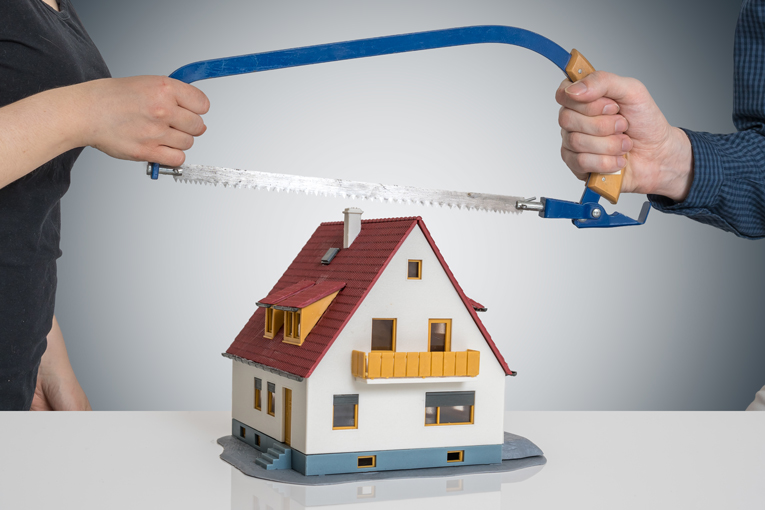Dividing the family home and mortgage during divorce or dissolution

The moment divorce enters the picture, your mortgage divorce UK situation demands immediate attention. That mortgage isn’t merely a debt, it’s likely your largest financial commitment, and mishandling it now could haunt your financial future for decades. Will the family home be lost? Can the payments be managed alone? Every concern racing through a homeowner’s mind at this moment has an answer, but navigating these waters requires professional guidance. Before signing any documents or making decisions about property rights, seeking expert legal advice is absolutely essential.

Key Takeaway: What happens to my mortgage responsibility after I divorce?
Read this comprehensive guide to protect your financial future and avoid common mortgage pitfalls during divorce.
Initial steps to protect your interests
First things first: forget emotional attachments for a moment and treat this as what it is: a critical business matter requiring prompt action. What happens if you have a joint mortgage and split up depends entirely on the steps taken in these early days. Start by ordering a mortgage capacity report divorce – not tomorrow, not next week, but today. Document every penny going in and out of joint accounts. And here’s something most solicitors won’t tell you straight away: if you’re still living together, create a paper trail of who’s paying what. The courts aren’t interested in verbal agreements or good intentions. They want cold, hard evidence. Your future borrowing capacity hangs on these early decisions, and a single misstep could derail your options for independent housing.
Your mortgage status when marriage ends
Here’s the stark reality about joint mortgage separation: that financial contract doesn’t bend to accommodate your changing relationship status. The moment you separate, your mortgage transforms from a shared commitment into a potential minefield. Whether one party stays in the property or not, both names on that mortgage mean both remain legally answerable, a fact that has caught countless couples off guard.
- Legal standing during separation: The unvarnished truth about can you keep a joint mortgage after divorce? Your lender remains unmoved by your divorce petition. That mortgage agreement stands unshakeable until formally restructured. Vacating the property? Immaterial. New partner residing there? The bank maintains its original position. Your contractual commitments persist until court intervention or formal modification.
- Understanding financial liability: Let’s be absolutely clear about divorce mortgage in my name only: it’s not a straightforward administrative switch. Each party bears complete responsibility for every instalment until formal alterations take effect. Consider it akin to a financial bond, physical departure doesn’t dissolve the obligation. Today’s lending requirements far exceed those when you initially secured your mortgage. Your standalone income faces rigorous assessment against current standards.
- Managing monthly payments: Here’s what extensive experience in matrimonial finance reveals: disrupting payments during separation spells disaster. When joint mortgage paid by one person UK situations arise, any default impacts both parties’ credit ratings, regardless of private arrangements. The lender’s stance remains unwavering. They’ll hold both signatories accountable for any arrears.
Main options for your mortgage after divorce
Make no mistake: when handling a mortgage divorce UK situation, there’s no one-size-fits-all solution. Four primary paths lie ahead, each with distinct implications for your financial future:
- Property sale: Often the cleanest solution, but don’t assume it’s the simplest. A sale terminates the mortgage, divides equity, and allows both parties to start afresh. However, in today’s property market, timing is crucial. Market conditions could mean selling at a loss, while delayed sales can trap both parties in financial limbo. Consider whether how can I afford to live on my own after divorce UK becomes achievable after splitting sale proceeds.
- Solo mortgage transfer: Divorce mortgage in my name only requires passing stringent lending criteria. Many discover their income alone won’t support the existing mortgage. Before pursuing this route, obtain a mortgage capacity report divorce. It’s pointless entertaining this option without confirmation of your borrowing capability. Remember: lenders scrutinize solo applications more rigorously than joint ones.
- Maintaining joint arrangements: Can you keep a joint mortgage after divorce? Yes, but it’s fraught with risk. This arrangement demands watertight legal agreements about payment responsibilities and property maintenance. One party’s financial mishap becomes both parties’ problem. Future borrowing capacity remains constrained for both individuals, potentially impacting new relationships and financial opportunities.
- Buying out your ex-partner: When can’t afford to buy out partner surfaces as a concern, explore creative solutions. Equity release, deferred payment arrangements, or pension offsetting might bridge the gap. However, ensure any agreement accounts for future property value fluctuations and interest rate changes.
Legal process and your mortgage
Let’s dispel a common myth: the courts cannot force your mortgage lender to restructure your loan. Even with the most meticulously crafted court order, your mortgage divorce UK situation ultimately requires lender cooperation. Understanding this limitation shapes every legal decision ahead.
- The power of court orders: When considering how to get an ex out of your house legally UK, court orders become your primary tool. However, they’re only effective when properly structured. A court can order property transfer, but cannot override your mortgage contract. The judge’s power extends to ordering a sale, transferring equity, or mandating payments, but the mortgage lender retains final say on any loan modifications.
- Your property rights: If I leave marital home what are my rights UK represents a crucial question. Leaving the property does not surrender your rights to it. The matrimonial home rights remain protected regardless of whose name appears on the deeds. However, these rights must be properly registered to prevent unauthorized property dealings. Courts examine contribution history, not just financial input but also non-financial contributions to the family welfare.
- Safeguarding your position: Does my ex have to pay half the mortgage and child support UK? These obligations depend entirely on court orders or formal agreements. Without proper legal documentation, you’re vulnerable to default by your ex-partner. Every financial order must account for both immediate needs and future scenarios, including potential interest rate changes or income fluctuations.
Confronting common mortgage dilemmas
When mortgage divorce UK complications arise, you need pragmatic answers, not wishful thinking. Let’s address the thorniest challenges that surface in matrimonial finance:
- Facing solo mortgage reality: How can I afford to live on my own after divorce UK? When calculations show you can’t manage alone, act swiftly. Consider rental income from lodgers, negotiate a stepped payment plan, or explore downsizing. Financial survival demands creative thinking. Remember: temporary solutions can bridge the gap while you rebuild financial stability.
- When payments stop: What happens if you have a joint mortgage and split up and payments suddenly cease? Don’t waste time with angry texts. Document the default immediately. Contact your lender. File for emergency court intervention if necessary. Every missed payment damages both parties’ credit ratings, regardless of private agreements. Swift, formal action protects your financial future.
- Navigating buy-out barriers: Can’t afford to buy out partner? Traditional financing isn’t your only option. Explore equity release, deferred payment arrangements, or shared ownership Consider offsetting the property share against other matrimonial assets. Creative solutions often emerge when conventional paths close, but they require proper legal structuring.
- Trapped in negative equity: When property value falls below mortgage debt, panic helps no one. If joint mortgage paid by one person UK becomes unsustainable due to negative equity, explore mortgage holiday options, negotiate with lenders for temporary payment reductions, or consider renting out the property while maintaining joint ownership until market conditions improve.
Do I need a solicitor to protect my mortgage rights after divorce?
Navigating mortgage divorce UK without legal expertise invites disaster. Every day, family courts witness cases that demonstrate precisely when professional legal protection becomes non-negotiable.
When cooperation turns to conflict: The moment your ex-partner becomes hostile about property matters, legal protection becomes crucial. When they refuse to leave despite agreements, threaten to stop joint mortgage paid by one person UK payments, or attempt unauthorized property dealings, you need immediate legal intervention. These situations can escalate rapidly, potentially devastating your financial stability.
Navigating financial complexities: When you discover you can’t afford to buy out partner, or face properties with multiple mortgages, legal expertise becomes essential. Business-linked mortgages particularly require careful handling to protect both personal and professional interests.
Protecting your future position: What happens if you have a joint mortgage and split up often reveals hidden complications months later. Legal expertise proves invaluable when establishing legally binding payment arrangements and securing your position with lenders. Without proper legal protection, verbal agreements and well-meaning promises can crumble, leaving your financial future vulnerable.
Remember: Early legal intervention costs significantly less than correcting mistakes later.
FAQs
- Is my wife entitled to half my house if we divorce? Not automatically. Mortgage divorce UK courts consider marriage length, contributions, childcare, and future needs when dividing property. The 50/50 split is a starting point, not a rule.
- Do I still have to pay the mortgage if I move out? With joint mortgage separation, your legal obligation continues until the mortgage is formally transferred or property sold, regardless of who lives there.
- Can my ex take my name off the mortgage? Only if they can prove affordability and the lender approves a divorce mortgage in my name only. Both parties must agree to the change.
- Can my ex force me to sell the house? If no agreement is reached, either party can request a court-ordered sale, especially when can’t afford to buy out partner.
- Can my wife refuse to sell the house in a divorce? Initially yes, but courts can ultimately order a sale. Exception: homes with children may have protected occupancy for a set period.
- What do I do if I can’t afford to buy out my ex? Consider deferred buyout, shared ownership, equity release, or extended mortgage terms. Seek immediate financial advice.
Navigating mortgage divorce UK situations demands swift, informed action. Whether maintaining joint mortgage separation or seeking divorce mortgage in my name only, professional guidance is crucial. Don’t let today’s uncertainty compromise your financial future. Protect your interests with proper legal and financial support.
Don’t navigate your mortgage divorce alone!
For expert guidance on your mortgage divorce UK situation, connect with Qredible’s network of specialist family law solicitors.
KEY TAKEAWAYS
- Understanding your mortgage divorce UK situation requires immediate action, as legal obligations continue regardless of living arrangements or personal agreements.
- Professional assessment through a mortgage capacity report divorce is essential before making decisions about keeping, transferring, or ending joint mortgage arrangements.
- Financial obligations remain binding for all parties named on a joint mortgage separation until formal changes are legally documented and approved by lenders.
- Early legal intervention prevents costly mistakes, protects your credit rating, and ensures your interests are safeguarded throughout the property division process.
- Creative solutions exist for those who can’t afford to buy out partner, including deferred payments, shared ownership, and equity release options.
Do you need a solicitor?
Find a solicitor on Qredible in just a few easy steps















